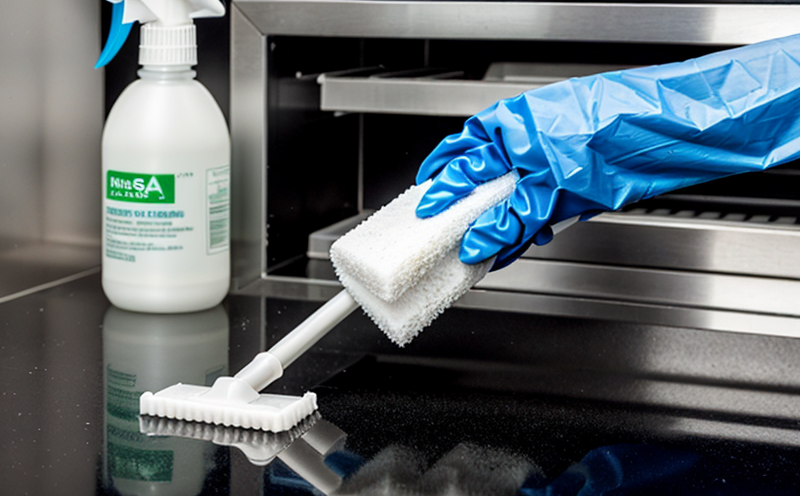ISO 14698 Biocontamination Testing of Plastic Hygiene Surfaces
The ISO 14698 standard is designed to ensure that plastic hygiene surfaces are free from biocontaminants, which can have significant implications for public health and safety. This service involves testing the cleaning efficacy of plastics used in hygiene environments such as hospitals, food processing facilities, and public restrooms. The testing process ensures compliance with international standards and helps maintain a hygienic environment by eliminating potential sources of contamination.
Testing under ISO 14698 involves exposing plastic samples to known biocontaminants, typically bacteria or fungi, and then evaluating the effectiveness of various cleaning agents on these surfaces. The standard provides detailed protocols for specimen preparation, inoculation, incubation, and measurement of cleanliness post-cleaning. By adhering to these stringent guidelines, we can provide reliable data that helps manufacturers improve their products' hygiene performance.
Our team of experts uses advanced analytical techniques including scanning electron microscopy (SEM), Fourier transform infrared spectroscopy (FTIR), and microbiological culture methods to assess the presence and removal of biocontaminants. These tools allow us to identify even trace amounts of harmful microorganisms, ensuring that our clients receive accurate results.
Compliance with ISO 14698 is crucial for businesses operating in regulated industries where hygiene standards are paramount. Whether you're a manufacturer looking to improve your product's marketability or an end-user seeking assurance about the safety of materials used in daily life, this service offers peace of mind by providing robust evidence of cleanliness and contamination levels.
The benefits extend beyond mere compliance; they include enhanced reputation among consumers who value health and wellness above all else. Additionally, meeting these standards can open doors to new markets or partnerships with organizations that prioritize sustainability and ethical practices.
In summary, ISO 14698 biocontamination testing of plastic hygiene surfaces not only meets regulatory requirements but also plays a vital role in safeguarding public health while fostering trust between companies and their customers. By offering this comprehensive service, we contribute significantly towards maintaining high standards of cleanliness across various sectors.
Quality and Reliability Assurance
At our laboratory, ensuring the quality and reliability of every test result is a top priority. We employ state-of-the-art equipment and follow strict protocols to maintain accuracy and consistency throughout each testing process. Our experienced technicians are trained in the latest methodologies recommended by international standards like ISO 14698.
Our commitment to excellence extends beyond just performing tests; it also includes continuous improvement through regular training programs and participation in external proficiency testing exercises. This ensures that our methods remain up-to-date with industry best practices and scientific advancements.
- We use advanced instruments for precise measurements, such as scanning electron microscopes (SEM) and Fourier transform infrared spectrometers (FTIR).
- Our team adheres strictly to ISO 14698 guidelines during every phase of the testing procedure.
- Regular audits are conducted internally to verify compliance with established procedures.
The reliability of our results is further enhanced by rigorous validation processes involving independent reviews and cross-checks. This approach guarantees that clients receive trustworthy data they can rely upon for decision-making purposes.
International Acceptance and Recognition
ISO 14698 biocontamination testing of plastic hygiene surfaces is widely accepted across numerous countries due to its rigorous nature and emphasis on public health. Many governments, regulatory bodies, and private entities recognize compliance with this standard as a benchmark for ensuring safe and hygienic products.
Notably, several prominent organizations such as the European Union (EU), United States Food and Drug Administration (FDA), World Health Organization (WHO), and Centers for Disease Control and Prevention (CDC) acknowledge ISO 14698. This recognition underscores the importance of meeting these standards in maintaining international trade relations and fostering trust among consumers.
The global acceptance of this standard also contributes to broader efforts aimed at reducing healthcare-associated infections (HAIs). By adhering to ISO 14698 guidelines, manufacturers can help prevent cross-contamination within facilities, thereby contributing positively towards overall public health outcomes.
Competitive Advantage and Market Impact
The implementation of ISO 14698 biocontamination testing provides significant competitive advantages for businesses operating in the healthcare, food processing, and hospitality sectors. Here are some key points highlighting its market impact:
- Increase Customer Confidence: Compliance with international standards instills trust among consumers regarding product safety and effectiveness.
- Promote Brand Reputation: Leading brands that comply with these standards often enjoy higher brand loyalty and market share.
- Expand Market Reach: Meeting global hygiene standards opens up opportunities for expansion into new markets or regions where strict regulations apply.
- Differentiation from Competitors: Offering this service can set your company apart from competitors who may not prioritize such stringent testing practices.
- Potential Cost Savings: Early detection of contamination issues through regular testing can prevent costly recalls and repairs down the line.
- Enhanced Regulatory Compliance: Ensuring compliance with international standards helps avoid potential legal challenges or fines associated with non-compliance.
In conclusion, embracing ISO 14698 biocontamination testing demonstrates a strong commitment to public health and safety. This proactive approach not only meets regulatory expectations but also contributes positively towards achieving long-term business success in today’s competitive landscape.





